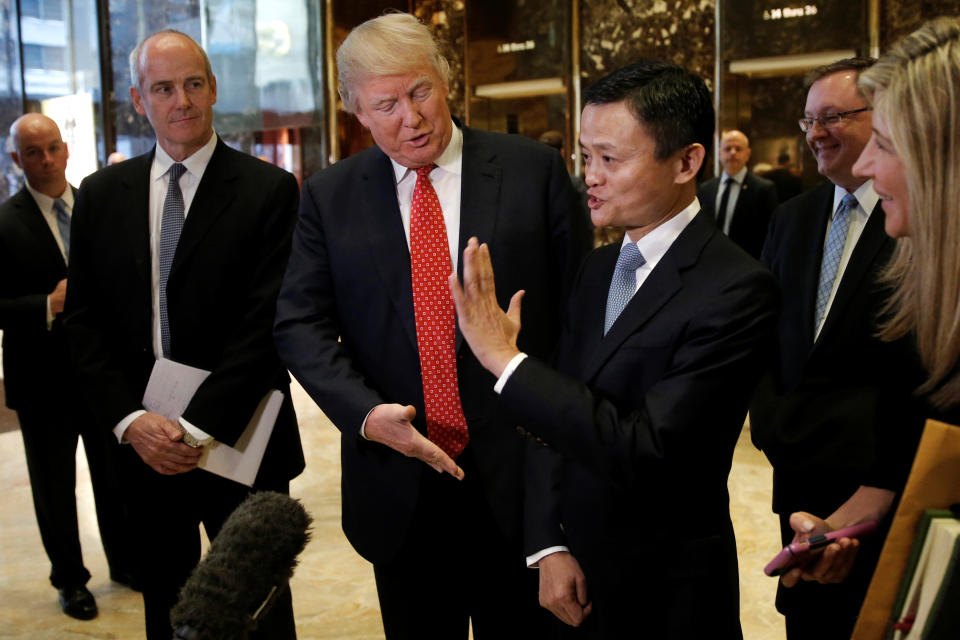For Trump administration, Ant Group is not the same as TikTok
The Trump administration is looking into potential restrictions against Chinese tech giants Ant Group and Tencent in the U.S., according to a report from Bloomberg.
The report cautions that the idea has not even been presented to President Trump himself, that “a final decision is not imminent,” and that, “officials acknowledge that it would be difficult to move forward until they sort out the mechanism.”
The administration’s concern is over the digital payment platforms the two companies own, Alipay and WeChat Pay, respectively, and the possibility that the apps could pose a risk to U.S. data security.
At first glance, the situation looks like the inevitable next step after Trump’s crackdown on TikTok, which forced parent company ByteDance to sell a minority stake to Oracle and Walmart. The Trump vs TikTok news cycle even started the same way: with rumors that the White House was looking to ban the app, then reporters asking Trump about it, and his answers starting off vague (July 31: “We’re looking at TikTok”) and escalating rapidly from there (Aug. 3: Trump declared ByteDance must sell TikTok to a U.S. company by Sept 15.)
After Trump cracked down on Huawei and then TikTok, Tencent was thrown around as the potential next Chinese tech target.
But Ant Group presents a very different situation from TikTok.

Ant Group (formerly Ant Financial Services Group, before a June rebrand) is the spun-off payments arm of Alibaba. Before Alibaba’s $25 billion IPO in 2014 (the world’s largest IPO until Saudi Aramco raised $29 billion last year), CEO Jack Ma spun off Ant Financial, and in 2018, Alibaba took a 33% stake in Ant.
Ant’s core product is Alipay, the No. 1 mobile payments app in China. Alipay hit 1.2 billion users last year and owns more than a 50% share of China’s massive mobile payments market. The other huge product Ant owns is Yu’ebao, China’s largest money-market fund, with $170 billion in assets. Ant is now planning a dual IPO in Shanghai and Hong Kong that is expected to raise more than $30 billion, eclipsing Saudi Aramco.
Almost zero of Ant’s enormous business comes from America. You need a Chinese bank account to use Alipay. The only presence Ant has in the U.S. is through partnerships it has begun to sign with retailers like Walgreens to let Chinese tourists in the U.S. pay with the Alipay app. (Of course, amid the pandemic, there is no China-U.S. tourism happening right now.) Last year, Alipay also did the inverse: it opened up its app to American tourists in China.
Nearly 96% of Ant’s revenue comes from mainland China. The other 4.4% of its revenue comes from other countries, and only a sliver of that from the U.S.
WeChat Pay is the same story as Alipay: tiny presence in the U.S., though parent company Tencent has arguably been more vocal than Ant about its intention to eventually grow its U.S. footprint. In 2018, Tencent opened two new cloud data centers in California and Virginia, and Tencent, unlike Alibaba, has a huge U.S. gaming business, as it owns Riot Games and 40% of Fortnite-maker Epic Games. Tencent’s gaming footprint in the U.S. has already caught the Trump administration’s eye.
TikTok, in contrast, has 100 million users in the U.S., a number that is increasing rapidly, and 60% are young people between ages 16 and 24. It’s also a social media app with a strong networking effect.
Of course, Trump administration officials have taken a hard-line stance against Chinese tech firms, and with Alibaba and Tencent, they likely want to nip them in the bud: restrict them before they get any bigger in the U.S. (In Ant’s case, there’s also some potentially relevant recent political history: In 2017, after a meeting with Trump, Jack Ma committed to creating 1 million new jobs in the U.S., then withdrew his promise in 2018 after Trump slapped a new round of tariffs on China.)
The response to Bloomberg’s report from an Ant spokesperson sounds like an expression of surprise: “Ant Group is unaware of any administration discussions. Ant Group's business is primarily in China and we are excited about our growth prospects in the China market.”
If the story grows in volume and it appears the Trump administration will crack down on Ant and Tencent, expect the companies to publicly pull back from their toe-dipping into the U.S. market. It could also put the giant Ant IPO in jeopardy. But for now, a crackdown looks unlikely, or at least strange—not to mention that there may not be a Trump administration by January.
—
Daniel Roberts is an editor-at-large at Yahoo Finance and closely covers fintech. Follow him on Twitter at @readDanwrite.
Read more:
What you need to know about Ant Financial, potentially the largest IPO in history
Ant Financial’s core product Alipay hits the 1 billion users mark
TikTok deal doesn’t make much sense for Oracle beyond politics, analysts say
Amazon tells employees to delete Tik Tok, then says email was ‘sent in error’
Square is positioned to be a winner by helping small businesses digitize post-pandemic: Oppenheimer
Airbnb's cash burn underscores the urgency of its upcoming IPO
How the Coinbase memo exemplifies Silicon Valley's current political crisis
Uber Eats is bigger business than Uber rides right now, but far from profitable

